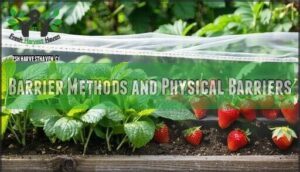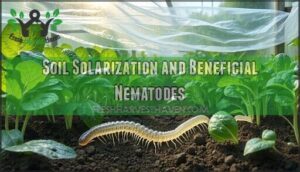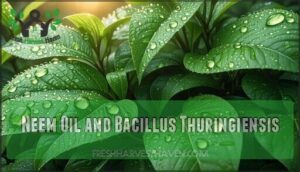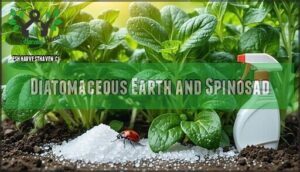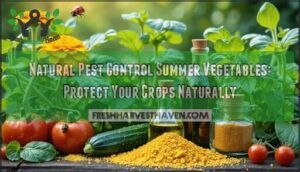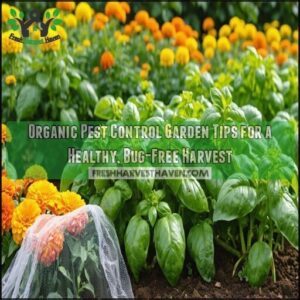This site is supported by our readers. We may earn a commission, at no cost to you, if you purchase through links.
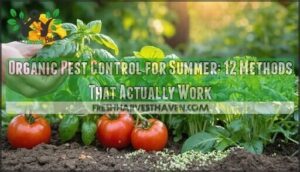 You’ll find organic pest control for summer works best when you combine multiple natural methods.
You’ll find organic pest control for summer works best when you combine multiple natural methods.
Start with companion planting – marigolds repel nematodes, basil deters beetles, and nasturtiums act as trap crops for aphids.
Use physical barriers like row covers and practice crop rotation to break pest cycles.
Beneficial insects become your garden allies when you plant dill and cilantro nearby, and for direct treatment, neem oil and diatomaceous earth target specific pests without harming beneficial species.
Handpicking larger pests and using traps handle immediate problems effectively, creating a balanced ecosystem where nature does most of the work for you, through these time-tested methods.
Table Of Contents
- Key Takeaways
- Organic Pest Control Methods
- Natural Pest Control Techniques
- Effective Organic Pest Control
- Summer Pest Control Strategies
- Sustainable Gardening Practices
- Frequently Asked Questions (FAQs)
- Does organic pest control really work?
- How to get rid of pests organically?
- What are the disadvantages of organic pest control?
- Does spraying vinegar on plants keep bugs away?
- What keeps bugs away in the summer?
- What do organic farmers use for pest control?
- What is the best organic pest control?
- What is the most environmentally friendly method for controlling pests?
- When to apply organic pest treatments?
- How to make homemade organic pesticides?
- Conclusion
Key Takeaways
- Combine multiple organic methods for maximum effectiveness – you’ll get better results using companion planting, beneficial insects, and physical barriers together rather than relying on a single approach.
- Focus on prevention through healthy soil and garden hygiene – you’ll avoid most pest problems by maintaining strong plants, removing debris weekly, and rotating crops annually to break pest cycles.
- Time your treatments strategically – you’ll achieve better control by applying organic pesticides like neem oil during early morning or evening hours when beneficial insects aren’t active.
- Build a balanced ecosystem with beneficial insects – you’ll create long-term pest management by attracting ladybugs, parasitic wasps, and other natural predators through diverse plantings and habitat diversity.
Organic Pest Control Methods
You can tackle summer pests naturally without harsh chemicals by using methods that work with your garden’s ecosystem.
These organic approaches protect your plants while keeping beneficial insects happy and your family safe.
Handpicking and Trapping
With your trusty hands and simple tools, you become the garden’s guardian against unwanted invaders. Manual Removal works best in early morning when pests are sluggish and easy to spot.
Beer Trap Efficacy peaks when containers sit slightly above ground level, luring slugs into their doom overnight. Sticky Trap Design matters—yellow attracts aphids while blue draws thrips.
Position Copper Tape Barriers around stems to create an electric fence effect against soft-bodied pests. Your Early Morning Hunts pay off when you catch hornworms before they disappear into hiding.
To further deter pests, consider planting pest-repelling herbs.
- Handpicking with tweezers gives you precision control over tiny troublemakers
- Trap effectiveness doubles when you check and refresh them daily
- Trap placement near damaged plants catches pests red-handed
- Garden traps work harder when positioned along pest highways
- Beer traps become slug magnets when filled with cheap, yeasty brew
Crop Rotation and Row Covers
Smart gardeners know that timing and strategy beat luck in pest control. Crop rotation breaks pest cycles by moving plant families each season, confusing overwintering insects that can’t find their preferred hosts. This simple practice delivers impressive rotation benefits for soil health and summer pest control.
Row covers shield vulnerable plants during critical growth periods. Different cover materials offer varying protection levels:
Your planting schedule determines cover success—install immediately after seeding for maximum organic pest control effectiveness in garden pest control.
Biological Control Agents
While row covers protect your plants from flying pests, biological control agents work beneath the surface to eliminate threats at their source.
These living pest controllers create a natural defense system that outperforms chemical sprays. Your garden’s biological control agents include natural predators like ladybugs that consume 5,000 aphids during their lifetime. Parasitic wasps target specific pests by laying eggs inside hornworms and caterpillars, while beneficial insects maintain ecosystem balance without harming your crops.
Here’s your three-step biological arsenal:
- Beneficial nematodes attack over 200 soil-dwelling pest species with impressive nematode effectiveness, eliminating grubs within 48 hours
- Microbial agents like Bacillus thuringiensis target caterpillars while protecting beneficial insects from fungal infections
- Attracting birds and maintaining diverse flowering plants supports natural predators year-round
Implementing IPM strategies means combining these biological control agents with habitat management. Consider using nematodes for pest control in your garden. Plant diverse flowers, minimize pesticide use, and let these microscopic warriors handle pest control naturally.
Natural Pest Control Techniques
When chemical pesticides aren’t an option, you’ve got three powerful natural techniques that work with nature instead of against it.
These methods create long-term solutions by building a balanced garden ecosystem that keeps pests in check naturally.
Companion Planting Benefits
Three strategic companion planting partnerships create powerful chemical barriers that revolutionize your summer garden’s defense system.
Beneficial insects flock to diverse plantings like marigolds with tomatoes, which repel nematodes while attracting pollinators. This plant pairing approach delivers growth enhancement through natural pest deterrents while maximizing space maximization.
Your garden becomes a self-protecting ecosystem where aromatic compounds confuse harmful insects, supporting pollinator attraction naturally without chemicals.
Barrier Methods and Physical Barriers
Physical barriers act like invisible bodyguards for your garden, working 24/7 without chemicals.
Nature’s security team guards your plants around the clock—no chemicals required.
Row cover types include lightweight fabrics and heavier materials that block pests while allowing sunlight through. Mesh netting benefits include filtering flying insects without restricting growth. Copper tape uses create slug-proof zones around beds—these pests won’t cross the mild electrical sensation.
Here’s your barrier toolkit:
- Row covers prevent 95% of pest contact while maintaining plant health
- Bird netting protects ripening fruits from feathered thieves
- Plant collars shield seedling stems from cutworm attacks
- Copper tape creates impassable boundaries for slugs and snails
- DE application around barriers adds extra protection against crawling insects
These natural barriers require zero mixing or reapplication—just install once and watch them work their magic. Improving soil health can further bolster plant defenses against pests, reducing reliance on barriers alone, so consider adding organic matter to your soil.
Soil Solarization and Beneficial Nematodes
Beyond physical barriers, your garden’s underground battle against pests can be won with two powerful allies.
Soil solarization turns summer heat into your secret weapon.
Cover moist soil with clear plastic sheeting for 4-6 weeks during peak temperatures.
This process creates solarization benefits by raising soil temperatures to 113-140°F, eliminating harmful pathogens and improving soil health naturally.
To confirm effective solarization, consider the various plastic sheeting options available.
Beneficial nematodes act as microscopic pest hunters through targeted nematode application.
These tiny warriors attack over 200 soil-dwelling pests within 48 hours.
Nematode Types Targeted Pests
Combined, these methods deliver sustainable control and remarkable pest reduction for your organic pest control arsenal.
Effective Organic Pest Control
When pests invade your summer garden, you need weapons that work without poisoning your plants or family.
These proven organic methods target specific pests while keeping your garden healthy and productive.
Neem Oil and Bacillus Thuringiensis
Neem oil and Bacillus thuringiensis deliver powerful organic pest control without harsh chemicals. These organic pesticides work differently—neem disrupts insect hormones while BT targets caterpillar digestive systems specifically.
Neem Applications work best during evening hours to prevent leaf burn. BT Effectiveness peaks when caterpillars actively feed, making timing vital for Caterpillar Control.
To further enhance your garden’s defenses, consider interplanting for pest control.
Here’s your action plan:
- Apply neem oil every 7-14 days for aphids and spider mites
- Spray BT when caterpillars are small for maximum impact
- Rotate between treatments for Resistance Management
- Mix with water only to maintain Organic Compatibility
- Target specific pests rather than broadcasting everywhere
Both products stay effective throughout summer pest control season while protecting beneficial insects.
Diatomaceous Earth and Spinosad
Summer’s toughest pests require heavy-duty solutions that won’t compromise your garden’s health. Diatomaceous earth and Spinosad deliver knockout punches through completely different mechanisms, making them perfect organic pesticides for your summer pest control arsenal.
Diatomaceous earth consists of microscopic fossilized diatoms with razor-sharp edges that slice through insect exoskeletons, causing fatal dehydration. This mechanical action means crawling pests can’t develop resistance. Spinosad, derived from soil bacteria, targets pest nervous systems for rapid elimination while maintaining excellent Pest Specificity.
Both maintain Organic Certification standards while addressing Safety Concerns:
- DE Application creates protective barriers that physically damage crawling insects without harming beneficial pollinators
- Spinosad Resistance remains minimal, ensuring long-term effectiveness in your organic pest control strategies
- Both products break down naturally, leaving no harmful residues in soil or water systems
These allies work best when applied during early morning or evening hours. You can find various diatomaceous earth products online.
Natural Sprays and Red Pepper Wax
While physical barriers like diatomaceous earth work mechanically, natural sprays deliver targeted chemical compounds that repel pests effectively. You’ll discover that homemade pest control solutions offer powerful alternatives to commercial products.
Capsaicin effectiveness in hot pepper sprays creates burning sensations that deter mammals and crawling insects. Mix cayenne pepper with water and dish soap for immediate results. Spray recipes using garlic blend sulfur compounds that disrupt insects’ sensory systems, while neem oil interferes with pest reproduction cycles.
Red pepper wax provides weather-resistant protection that outlasts water-based solutions. Wax application creates long-lasting barriers against squirrels and ants, making it superior for summer insects management.
| Spray Type | Target Pests | Success Rate |
|---|---|---|
| Neem Oil | Aphids, Whiteflies | 85% |
| Garlic Spray | Beetles, Caterpillars | 78% |
| Hot Pepper | Mammals, Crawling bugs | 90% |
These natural alternatives demonstrate impressive pest specificity while maintaining safety for beneficial insects. Organic pest control methods like these prove that effective doesn’t mean harsh—nature provides powerful solutions when you know how to use them.
Summer Pest Control Strategies
Summer’s peak growing season brings both abundant harvests and hungry pests ready to feast on your hard work.
You’ll need targeted strategies that work fast when temperatures soar and pest populations explode overnight.
Preventing Pest Infestations
You’re building a fortress against summer pests, and Early Detection is your first line of defense. Weekly Pest Monitoring reveals problems before they become disasters.
Healthy Soil creates Strong Plants that naturally resist attacks, while Garden Hygiene eliminates pest breeding grounds.
Essential garden pest prevention strategies:
- Remove fallen fruit and debris weekly to maintain Garden Hygiene
- Choose resistant varieties suited to your climate zone
- Plant diverse flowers to attract natural pest deterrents
- Water at soil level to prevent fungal issues
- Rotate crops annually to break pest life cycles
These natural pest control methods work like a security system for your garden.
Controlling Garden Slugs and Snails
Garden slugs leave silvery trails of destruction across your leafy greens, but these organic pest control methods stop them naturally.
Beer traps remain the gold standard—these pests can’t resist fermented yeast and drown overnight in shallow containers. Copper barriers create electrical reactions with slug slime, deterring them instantly. Diatomaceous earth dehydrates soft-bodied pests on contact when sprinkled around plants. Handpicking during early morning hours catches them before they hide.
- Slug predators like ground beetles and birds provide natural population control
- Beer trap alternatives include yeast-water mixtures for similar effectiveness
- Wood ash use creates alkaline barriers that repel soft-bodied garden pests
Managing Squash Vine Borers and Cucumber Beetles
While slugs and snails love moisture, squash vine borers and cucumber beetles prefer your sun-loving plants.
These summer garden pests can destroy entire crops if you don’t act fast.
Understanding the vine borer lifecycle helps you fight back—adult moths emerge in early summer, laying eggs at stem bases.
Beetle identification is key: striped cucumber beetles have yellow bodies with black stripes, while spotted ones show twelve black spots.
Crop rotation tactics work wonders—move cucurbits to different garden areas yearly.
Beetle trap designs using yellow sticky cards capture adults effectively.
Resistant varieties like butternut squash naturally deter borers.
Check plants weekly for sawdust-like frass around stems, signaling borer activity.
These organic pest control methods protect your harvest without chemicals.
Sustainable Gardening Practices
You’re creating a garden ecosystem that works with nature instead of against it when you choose organic pest control methods.
These sustainable practices protect beneficial insects, reduce chemical runoff, and keep your family safe while maintaining effective pest management throughout the summer season.
Promoting Biodiversity and Ecosystem Balance
When you focus on sustainable pest control methods, you’re building something bigger than just a healthy garden – you’re creating a thriving ecosystem that works for you year-round.
Biodiversity transforms your space into a self-regulating system where beneficial insects and natural predators maintain ecosystem balance without constant intervention.
Habitat diversity strengthens soil health while providing essential ecosystem services like pollination and pest suppression.
Your garden ecosystem becomes a network of pollinator habitats that support natural cycles.
Here’s what you’ll see in action:
- Ladybugs patrol plants like tiny bodyguards, consuming thousands of aphids
- Birds hunt harmful insects while you sip your morning coffee
- Soil organisms work underground, building plant immunity naturally
Reducing Environmental Pollution and Health Risks
Everyone benefits when you choose pesticide alternatives over chemical sprays that threaten ecosystem health. Your organic pest control decisions prevent water contamination that seeps into groundwater and nearby streams, protecting your family from human exposure to harmful residues while safeguarding local wildlife.
Nontoxic pest control supports sustainable agriculture by eliminating three major threats:
- Water pollution that contaminates drinking supplies and harms aquatic life
- Soil degradation that destroys beneficial microorganisms essential for plant health
- Ecosystem disruption that eliminates natural pest predators and pollinators
Your chemicalfree pest control choices reduce environmental pollution while creating healthier neighborhoods. These ecofriendly pest control practices protect air quality, preserve soil health, and prevent toxic buildup in food chains. You’re basically becoming an environmental steward, quietly protecting your community’s wellbeing one garden decision at a time. Healthy gardens also fend off pests naturally.
Frequently Asked Questions (FAQs)
Does organic pest control really work?
Yes, organic pest control works effectively when you use proven methods like beneficial insects, companion planting, and natural barriers. You’ll see results combining multiple techniques consistently.
How to get rid of pests organically?
Nature’s pest patrol doesn’t require harsh chemicals.
You’ll handpick larger pests like hornworms, spray neem oil on aphids, and use beer traps for slugs.
Beneficial insects, companion plants, and diatomaceous earth create sustainable defense systems.
What are the disadvantages of organic pest control?
Organic pest control takes longer to show results compared to chemical pesticides, and you’ll need to reapply treatments more frequently.
Weather conditions can reduce effectiveness, and some methods require more labor and time investment, which can be a significant consideration for effectiveness.
Does spraying vinegar on plants keep bugs away?
Vinegar spray can repel some bugs like ants and fruit flies, but it’s not universally effective against all pests.
You’ll need to reapply frequently since vinegar evaporates quickly and loses potency.
What keeps bugs away in the summer?
Like a shield against summer’s tiny invaders, you’ll need multiple tactics to keep bugs at bay.
Use neem oil, diatomaceous earth, and companion plants like basil and marigolds for natural protection.
What do organic farmers use for pest control?
You’ll find beneficial insects, neem oil, diatomaceous earth, and companion planting. They use ladybugs for aphids, parasitic wasps for caterpillars, and garlic spray for general pest deterrence effectively.
What is the best organic pest control?
The best organic pest control combines multiple methods for maximum effectiveness. You’ll find success using beneficial insects like ladybugs, neem oil sprays, companion planting with marigolds, and physical barriers together.
What is the most environmentally friendly method for controlling pests?
Nature’s gentle warriors offer the greenest solution—beneficial insects, companion plants, and physical barriers work together harmoniously.
You’ll support ecosystems while protecting crops through integrated pest management that mimics natural processes.
When to apply organic pest treatments?
Apply organic pest treatments during early morning or evening hours when beneficial insects are less active.
Target treatments before pest populations explode, typically every 7-14 days during peak summer months for best results.
How to make homemade organic pesticides?
Mix garlic, hot peppers, and dish soap with water to create powerful sprays.
Blend neem oil solutions for aphids.
Strain mixtures well, test on small areas first, then apply during cool mornings for maximum effectiveness.
Conclusion
Ready to transform your summer garden into a pest-free paradise?
Success with organic pest control for summer depends on patience and persistence.
These natural methods work best when you combine them consistently throughout the growing season.
You’ll create a thriving ecosystem where beneficial insects outnumber harmful ones.
Start with companion planting and physical barriers, then add biological controls as needed.
Your garden will reward you with healthier plants and safer produce for your family to enjoy.
- https://www.gardenorganic.org.uk/expert-advice/garden-management/pests-and-diseases/organic-pest-control-for-fruit-and-vegetables
- https://zerowastehomestead.com/how-to-use-natural-pest-control-in-the-organic-garden/
- https://www.lawnstarter.com/blog/gardening-2/organic-pest-control-that-works/
- https://www.motherearthnews.com/organic-gardening/organic-pest-control-zm0z11zsto/
- https://opms.com/


